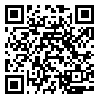BibTeX | RIS | EndNote | Medlars | ProCite | Reference Manager | RefWorks
Send citation to:
URL: http://ijme.tums.ac.ir/article-1-146-en.html
Despite advances in science and technology, human is not yet capable to produce a material or solution to compensate blood loss or act as blood this vital material of the body. Blood loss is only recovered through transfusion of blood prepared from donors.
Blood safety widely depends on the information obtained from voluntary blood donor. It is his/her ethical responsibility to provide valid information. On the other hand, some ethical issues about the donor and the recipients right should be considered. For this reason, the International Society of Blood Transfusion (ISBT), in 1980, in Montreal, approved the code of Ethics for Blood Transfusion. This code emphasizes on access to safe blood, free blood without need to be substituted, informed consent for blood transfusion, the right not to accept the blood and the right to be informed if they have been harmed. This article attempts to highlight some of the important points in blood transfusion medicine, and ethical aspects of blood transfusion according to the Islamic principles and Iran laws.
Accepted: 2017/09/27 | Published: 2017/09/27
| Rights and permissions | |
 |
This work is licensed under a Creative Commons Attribution-NonCommercial 4.0 International License. |





